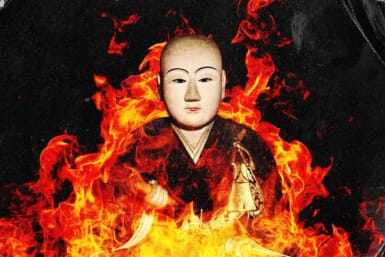On May 16, 1929, the first ever Academy Awards took place at the Hollywood Roosevelt Hotel in Los Angeles to honor the best films of the preceding two years. In the nine decades since there have been a few Japanese successes such as Miyoshi Umeki (Best Supporting Actress), Spirited Away (Best Animated Feature) and Departures (Best Foreign Language Film) to name but a few, though in truth the country’s history at the lavish ceremony has been far from stellar.
Classics such as Yasujiro Ozu’s masterpiece Tokyo Story failed to garner a single nomination. The same goes for the man widely considered Japan’s finest ever actor, Toshiro Mifune. There are then those that did manage to make the shortlist, yet to the dismay of many went home empty-handed. Here TW takes a look at five Japanese nominees we feel were unfairly snubbed at the Oscars.
The Burmese Harp
The first official competitive Academy Award for the Best Foreign Language Film (they’d previously been presented Special/Honorary Awards) went to Federico Fellini’s La Strada in 1957, however, several critics at the time felt The Burmese Harp by legendary Japanese director Kon Ichikawa would have made a more deserving recipient. An extremely powerful yet at the same time ethereal story about Japanese soldiers who fought in Burma at the end of World War II, the focus isn’t on good vs. evil or the inhumanity of the conflict, but rather the despair that the military men feel as they witness comrades needlessly dying for something that no longer exists.
Ichikawa, who went on to win two BAFTAs for his documentary film Tokyo Olympiad, remade The Burmese Harp in color with a new cast in 1985. Selling 4.5 million tickets, it was the highest domestic grossing film of the year and became the second largest Japanese Box Office hit ever at the time. For many, though, the original will always be the best. “It’s one of the five great films that exemplify what cinema means,” lead actor Rentaro Mikuni told Teruyo Nogami for the Criterion Channel in 1997. “I wish Japanese people would see more movies like The Burmese Harp… I want the young men of today to realize as early as possible, how senseless it is for us to kill one another.”
Akira Kurosawa
Competing alongside the likes of Orson Welles, Stanley Kubrick and Alfred Hitchcock for the title of the greatest filmmaker to never win a Best Director Oscar is the emperor of Japanese cinema Akira Kurosawa. During an illustrious career that spanned more than five decades, the Tokyo-native received international acclaim for movies such as Ikiru, Seven Samurai and Yojimbo, yet was only nominated once in the Best Director category for his 1985 King Lear-influenced epic action drama Ran. In the end, he missed out on the top prize to the safer option of Sydney Pollack for Out of Africa, a movie which picked up seven Academy Awards in total.
Five years earlier, Kurosawa’s excellent jidaigeki Kagemusha surprisingly lost out in the Best Foreign Language Film category to Moscow Does Not Believe in Tears, despite having earlier won the Palme D’Or at the Cannes Film Festival. His first non-Japanese film Dersu Uzala did pick up the Foreign Language Film prize in 1975, as did Rashomon in 1951 (though back then it was a special award without other nominees). The much-lauded director was also awarded an Honorary Oscar in 1990. “I have to ask whether I really deserve this?” he said after receiving the prize from George Lucas and Steven Spielberg. “I say that because I don’t feel I truly understand cinema yet. Cinema is a marvelous thing, but to capture its true essence is very difficult.”
Ken Watanabe
A TV actor largely unknown outside of his native Japan who only spoke a little English, Ken Watanabe’s prospects of winning the role of Lord Katsumoto Moritsugu in The Last Samurai didn’t seem great. Fortunately, he had prominent casting director Yoko Narahashi on his side and that made all the difference. “I just felt he had a star-like quality and should be doing more,” she told TW back in 2014. “I introduced him to the director (Edward Zwick), who was initially unconvinced, but I persuaded him to give Ken a second audition and I’m just delighted he did. He was just perfect for the part and I don’t think the movie would have been as good without him.”
It’s hard to disagree. Tom Cruise may have been the film’s star attraction, but it was Watanabe who stole the show. As Hollywood debuts go, it was an extremely accomplished one and earned the Niigata-born star an Academy Award nomination for Best Supporting Actor in 2004, making him the third Japanese man to make the shortlist in that category after Sessue Hayakawa (The Bridge on the River Kwai) and Mako Iwamatsu (The Sand Pebbles). The award went to Tim Robbins for his role as the murder suspect Dave in Mystic River. A brilliant actor no doubt, but it wasn’t his finest performance. Despite the snub, Watanabe’s career continued to blossom and in 2015, he became the first Japanese actor to be nominated for a Tony Award.
The Twilight Samurai
Ken Watanabe wasn’t the only Japanese nomination at the Oscars in 2004 with Yoji Yamada’s historical drama The Twilight Samurai also in the mix, nominated in the Best Foreign Language Film category. The first part of a trilogy (followed by The Hidden Blade and Love And Honor), it was a surprise for some to see Yamada make a period piece (his only previous jidaigeki was in 1966). He’s best-known in Japan for comical, heartwarming movies, most notably The Yellow Handkerchief and of course the Tora-San franchise, the world’s longest-running film series starring a single actor about a kind-hearted vagabond who can never find love. The Twilight Samurai was something of a departure for the prolific filmmaker, but still proved a domestic hit, picking up 12 Japan Academy Awards (just one fewer than Masayuki Suo’s all-time record-breaker Shall We Dance).
Starring Hiroyuki Sanada and Rie Miyazawa, it’s set a few years before the start of the Meiji Era and follows the life of a low-ranking samurai named Seibei Iguchi who’s coming to terms with the death of his wife while struggling to take care of his two daughters and senile mother. A shabbily dressed individual, he’s very different to the characters seen in The Last Samurai in which Sanada also appeared. Speaking to Mark Schilling in The Japan Times about the lead actor, Yamada said, “He had been in a lot of period dramas but told me he was dissatisfied with them. He wanted to know why everything was so beautiful when it wasn’t like that in reality. He told me it was his dream to make this kind of film.” The Twilight Samurai was seen as a strong contender to win the Best Foreign Language Film, but missed out on the famous gold statue to Denys Arcand’s Canadian-French sex-comedy drama, The Barbarian Invasions.
https://www.youtube.com/watch?v=tM6hcHp0_kU
The Tale of the Princess Kaguya
In 2003, a year after the Best Animated Feature category was added to the Academy Awards, Hayao Miyazaki’s Spirited Away became the first Studio Ghibli movie to win an Oscar. Some felt that would be the start of several triumphs for the acclaimed anime studio, yet despite many nominations since, it remains to this day the company’s only win at the ceremony (not including Miyazaki’s Honorary Award). While Miyazaki will always be the face of Studio Ghibli, Isao Takahata’s contributions to its success should never be overlooked. Not only did he discover and help mentor the great man, he also directed critically acclaimed movies such as Pom Poko, Only Yesterday and most notably Grave of the Fireflies about two young siblings trying to survive at the end of World War II.
Takahata’s first and only Oscar nomination came for The Tale of the Princess Kaguya released in 2013. Disappointingly, though not surprisingly, it lost to Disney’s Big Hero 6. It was his last ever film before he sadly passed away from lung cancer in 2018. A beautiful adaptation of the 10th-century Japanese folk-story The Tale of the Bamboo-Cutter it centers around the life of a mysterious girl called Kaguya who was discovered as a baby inside the stalk of a glowing bamboo plant. “The story really is about death in a way,” Takahata said in an interview with Film4’s Michael Leader. “Her return to the moon means death. And people do die, but I think what I wanted to stress is that before we die, we need to figure out how to live on this earth, how to live with a burning desire to be alive before our death.”
Feature photo: StockProduction / Shutterstock.com








